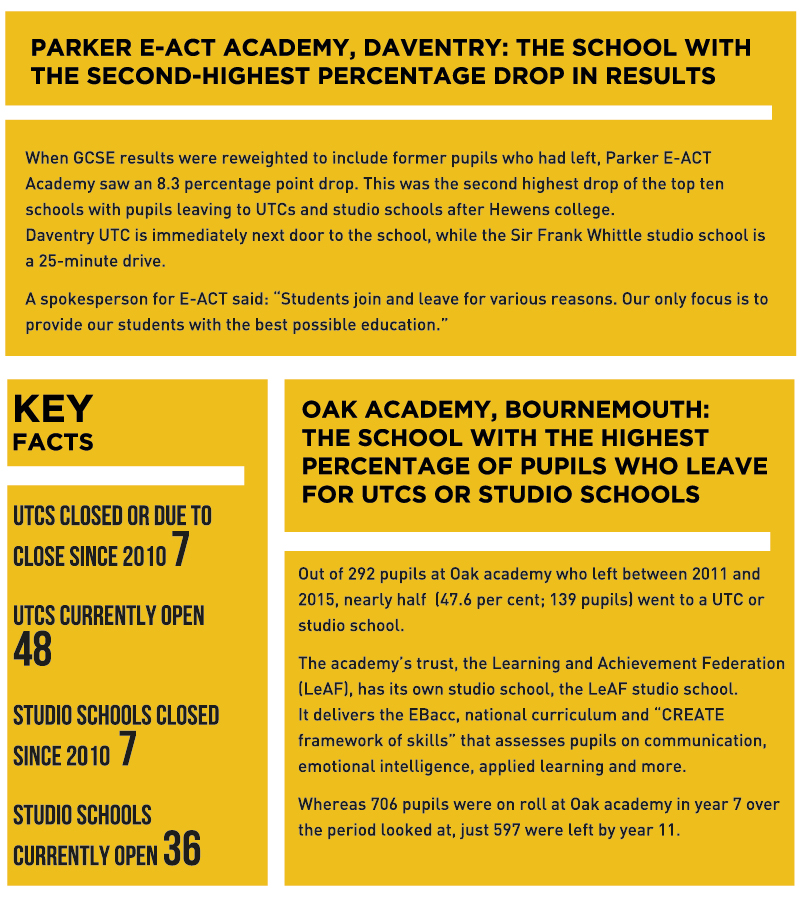Schools that lose high proportions of pupils to university technical colleges (UTCs) and studio schools often have to “reintegrate” youngsters a year later because institutions close or pupils “don’t enjoy” them.
Data obtained exclusively by Schools Week has revealed the ten schools with the largest percentage of pupils that left to join 14-19 institutions. The numbers do not show if pupils were encouraged to move by their school or went of their own volition.
The figures, supplied by Education Datalab as part of its ‘Who’s Left’ study, found all ten of the schools would have had lower GCSE results if the grades of their former pupils had been included.
I can’t see any advantage apart from schools being able to offload more challenging pupils
But as well as UTCs and studio schools having poorer outcomes for pupils, a Schools Week investigation has revealed two schools’ plans to switch pupils were thwarted when nearby 14-19 institutions closed.
Another school said pupils often came back because UTCs and studio schools did not suit their needs.
The findings come in the week that Greater Manchester UTC became the seventh to close or announce closure since their launch in 2010.
The government is consulting on plans to force councils to tell pupils about all the 14-19 institutions in their region.
Janet Downs, a former secondary teacher and campaigner for the Local Schools Network, which supports maintained schools, said: “I can’t see any advantage apart from schools being able to offload more challenging pupils. It could be disruptive.”
Datalab’s study found that Hewens college in west London had a 16.4 percentage point drop for pupils gaining five GCSEs at A* to C, including English and maths and equivalents, when former pupils were included in its 2014 results.
This was the largest difference for any of about 3,000 schools included in the data.
Nearly a quarter (23.8) of pupils who left Hewens between 2011 to 2015 headed to UTCs or studio schools.
The school is run by Rosedale Hewens Academy Trust. A third of the pupils that left another of the trust’s schools, Rosedale college (pictured), also moved to 14-19 institutions.
The trust said pupils moved “simply due to their choice of options”, and were able to study at two studio schools it ran – Parkside studio college, which is rated Ofsted “good”, and De Salis studio college, yet to be inspected.
In Yorkshire, nearly 30 per cent of pupils who left Goole academy, operated by Wakefield City Academy Trust (WCAT), also joined a studio school or UTC.
WCAT said some pupils went to the trust’s Create studio school before it closed in August 2015.
Only a small proportion of our students leave for an alternative UTC
But pupils had to be “reintegrated” back into Goole, the spokesperson said. “Now only a small proportion of our students leave for an alternative UTC.”
Stockwood Park academy and Chalk Hills academy, both in Bedfordshire and both run by the Shared Learning Trust, also had large numbers of pupils move to the Studio School Luton, but dwindling pupil numbers forced its closure in March last year.
A trust spokesperson said studio school pupils were moved back to other academies within the trust.
Meanwhile, Queen Elizabeth’s grammar school, in Derbyshire, which is non-selective, said between five and 10 pupils left every year in year 9 to join the JCB engineering academy, which is a UTC – but “about half tend to come back, because they don’t enjoy it”.
However, Jim Wade, principal of JCB, said that of the 198 pupils who started in September 2016, 194 were still on roll. He disputed that half had returned to their original school.
Wade added that the UTC was “always delighted by the positive response that we receive from parents and students” and that he recently received an email from two parents saying “how brilliant all the staff have been at the academy and how everyone is going above and beyond to help their son”.
Downs said these institutions seemed to be “a kind of alternative to alternative provision schools for less academically able pupils.
“There’s a nagging pattern here. Taking kids out of a school where they’ve been for three years to send them to another school at 14 – isn’t that too young to choose your specialism?”
But Charles Parker, chief executive of the Baker Dearing Educational Trust, which helped to found UTCs, insisted the institutions offered “high-quality technical education.
“It’s a big decision to change school at 14 and come to a UTC, and it will only suit a minority who want to relate their schooling to real life.”
A spokesperson for the Department for Education (DfE) said the “best UTCs are providing excellent technical and professional education”, adding that the UTC programme was being “strengthened through a number of reforms”.
They confirmed the DfE was consulting local authorities over plans they should write to parents of pupils “at the appropriate age about such schools in their area”, adding it was considering the responses.









Your thoughts